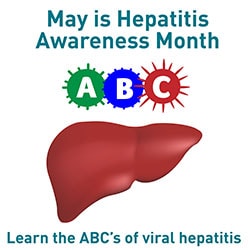Viral Hepatitis and Liver Cancer

For Hepatitis Awareness Month and national Hepatitis Testing Day on May 19th, learn more about the different types of viral hepatitis. Find out if you should get tested or vaccinated by taking a quick, online Hepatitis Risk Assessment.
May is Hepatitis Awareness Month. Hepatitis A, hepatitis B, and hepatitis C are three types of viral hepatitis. While each can produce similar symptoms, each hepatitis virus affects the liver differently, has different routes of transmission, and has different populations that are commonly affected.
CDC developed an online Hepatitis Risk Assessment to help people find out if they should get tested or vaccinated for viral hepatitis. The assessment, which takes only five minutes, will provide personalized testing and vaccination recommendations for hepatitis A, hepatitis B, and/or hepatitis C.

Hepatitis A
Hepatitis A is a short-term illness that is caused by infection with the hepatitis A virus. Hepatitis A was once very common in the United States, but the number of cases that occur each year is less than 3,000. Most people who get infected with the hepatitis A virus recover over time with no lasting effects. Hepatitis A is easily prevented with a safe and effective vaccine, which is recommended for all children at one year of age and for adults who may be at risk, including travelers to certain international countries. Since the introduction of the vaccine, new cases of hepatitis A have plummeted.
Hepatitis B
Hepatitis B is an infection caused by the hepatitis B virus. Some people who get infected, especially young children, can go on to develop a chronic or lifelong infection. Over time, chronic hepatitis B virus infection can cause serious liver damage, and even liver cancer. Hepatitis B is common in many parts of the world, including Asia, the Pacific Islands and Africa.
Hepatitis B is preventable with a vaccine. The hepatitis B virus can be passed from an infected woman to her baby at birth, if her baby does not receive the hepatitis B vaccine. As a result, the hepatitis B vaccine is recommended for all infants at birth and adults at risk. Unfortunately, many people got infected before the hepatitis B vaccine was widely available. That’s why CDC recommends anyone born in areas where hepatitis B is common, or whose parents were born in these regions, get tested for hepatitis B. Treatments are available that can delay or reduce the risk of developing liver cancer.
Hepatitis C
Hepatitis C is an infection caused by the hepatitis C virus. Most people who get infected go on to develop a chronic or lifelong infection, which can cause serious liver damage and even liver cancer over time. For reasons that are not entirely understood, people born from 1945 to 1965 are five times more likely to have hepatitis C than other age groups. In the past, hepatitis C was spread through blood transfusions and organ transplants. However, widespread screening of the blood supply began in 1990 and the hepatitis C virus was virtually eliminated from the blood supply by 1992. Today, most people become infected with hepatitis C by sharing needles, syringes, or any other equipment to inject drugs. In fact, rates of new infections have been on the rise in young people who inject drugs.
There is currently no vaccine to prevent hepatitis C. Fortunately, new treatments offer a cure for most people. Once diagnosed, most persons with hepatitis C can be cured in just 8 to 12 weeks, reducing liver cancer risk by 75%.
Find out if you should get tested or vaccinated for viral hepatitis by taking CDC’s quick online Hepatitis Risk Assessment.
More Information
Get Involved & Stay Connected
- Check out our resource center for free tools and ideas on how to get involved with Hepatitis Awareness Month and Hepatitis Testing Day.
- Join the conversation on hepatitis by following @cdchep on Twitter and use hashtags #HepAware, #HepTestingDay, and #hepatitis.
- Sign up and support the Be #HepAware Thunderclap!
- Sign up for email updates from CDC’s Division of Viral Hepatitis.
Resources





















.png)












No hay comentarios:
Publicar un comentario